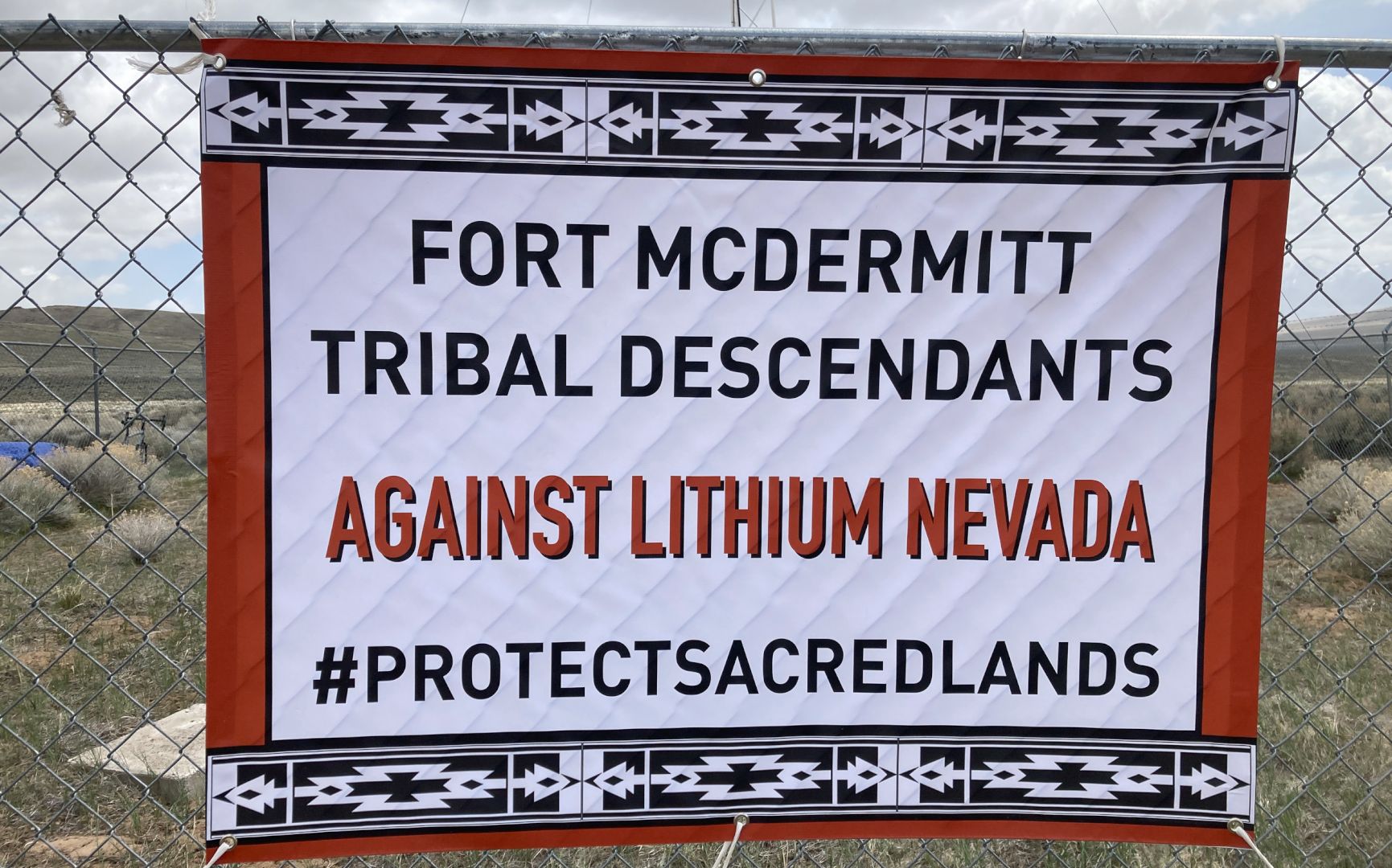In this statement, Atsa koodakuh wyh Nuwu (the People of Red Mountain), oppose the proposed Lithium open pit mines in Thacker Pass. They describe the cultural and historical significance of Thacker Pass, and also the environmental and social problems the project will bring.
We, Atsa koodakuh wyh Nuwu (the People of Red Mountain) and our native and non-native allies, oppose Lithium Nevada Corp.’s proposed Thacker Pass open pit lithium mine.
This mine will harm the Fort McDermitt Paiute-Shoshone Tribe, our traditional land, significant cultural sites, water, air, and wildlife including greater sage grouse, Lahontan cutthroat trout, pronghorn antelope, and sacred golden eagles. We also request support as we fight to protect Thacker Pass.
”Lithium Nevada Corp. (“Lithium Nevada”) – a subsidiary of the Canadian corporation Lithium Americas Corp. – proposes to build an open pit lithium mine that begins with a project area of 17,933 acres. When the Mine is fully-operational, it would use 5,200 acre-feet per year (equivalent to an average pumping rate of 3,224 gallons per minute) in one of the driest regions in the nation. This comes at a time when the U.S. Bureau of Reclamation fears it might have to make the federal government’s first-ever official water shortage declaration which will prompt water consumption cuts in Nevada. Meanwhile, despite Lithium Nevada’s characterization of the Mine as “green,” the company estimates in the FEIS that, when the Mine is fully-operational, it will produce 152,703 tons of carbon dioxide equivalent emissions every year.
Mines have already harmed the Fort McDermitt tribe.
Several tribal members were diagnosed with cancer after working in the nearby McDermitt and Cordero mercury mines. Some of these tribal members were killed by that cancer.
In addition to environmental concerns, Thacker Pass is sacred to our people. Thacker Pass is a spiritually powerful place blessed by the presence of our ancestors, other spirits, and golden eagles – who we consider to be directly connected to the Creator. Some of our ancestors were massacred in Thacker Pass. The name for Thacker pass in our language is Peehee mu’huh, which in English, translates to “rotten moon.” Pee-hee means “rotten” and mm-huh means “moon.” Peehee mu’huh was named so because our ancestors were massacred there while our hunters were away. When the hunters returned, they found their loved ones murdered, unburied, rotting, and with their entrails spread across the sage brush in a part of the Pass shaped like a moon. To build a lithium mine over this massacre site in Peehee mu’huh would be like building a lithium mine over Pearl Harbor or Arlington National Cemetery. We would never desecrate these places and we ask that our sacred sites be afforded the same respect.
Thacker Pass is essential to the survival of our traditions.
Our traditions are tied to the land. When our land is destroyed, our traditions are destroyed. Thacker Pass is home to many of our traditional foods. Some of our last choke cherry orchards are found in Thacker Pass. We gather choke cherries to make choke cherry pudding, one of our oldest breakfast foods. Thacker Pass is also a rich source of yapa, wild potatoes. We hunt groundhogs and mule deer in Thacker Pass. Mule deer are especially important to us as a source of meat, but we also use every part of the deer for things like clothing and for drumskins in our most sacred ceremonies.
Thacker Pass is one of the last places where we can find our traditional medicines.
We gather ibi, a chalky rock that we use for ulcers and both internal and external bleeding. COVID-19 made Thacker Pass even more important for our ability to gather medicines. Last summer and fall, when the pandemic was at its worst on the reservation, we gathered toza root in Thacker Pass, which is known as one of the world’s best anti-viral medicines. We also gathered good, old-growth sage brush to make our strong Indian tea which we use for respiratory illnesses.
Thacker Pass is also historically significant to our people.
The massacre described above is part of this significance. Additionally, when American soldiers were rounding our people up to force them on to reservations, many of our people hid in Thacker Pass. There are many caves and rocks in Thacker Pass where our people could see the surrounding land for miles. The caves, rocks, and view provided our ancestors with a good place to watch for approaching soldiers. The Fort McDermitt tribe descends from essentially two families who, hiding in Thacker Pass, managed to avoid being sent to reservations farther away from our ancestral lands. It could be said, then, that the Fort McDermitt tribe might not be here if it wasn’t for the shelter provided by Thacker Pass.
We also fear, with the influx of labor the Mine would cause and the likelihood that man camps will form to support this labor force, that the Mine will strain community infrastructure, such as law enforcement and human services. This will lead to an increase in hard drugs, violence, rape, sexual assault, and human trafficking. The connection between man camps and missing and murdered indigenous women is well-established.
Finally, we understand that all of us must be committed to fighting climate change. Fighting climate change, however, cannot be used as yet another excuse to destroy native land. We cannot protect the environment by destroying it.
Sign the petition from People of Red Mountain: https://www.change.org/p/protect-thacker-pass-peehee-mu-huh
Donate: https://www.classy.org/give/423060/#!/donation/checkout
For more on the Protect Thacker Pass campaign

